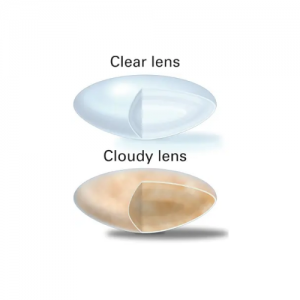Cloudy Eyes: Cataracts in Myrtle Beach
It’s June, which means it’s Cataract Awareness Month!
If you are looking for a practice to perform your cataract surgery in the Myrtle Beach area, look no further! At Coastal Eye Group we use the most up-to-date technology and techniques to provide patients with the best possible refractive outcomes following cataract surgery. We use the phacoemulsification technique combined with an incision small enough to avoid the use of sutures. This not only speeds the recovery process, but also allows most patients to begin to see well within a few hours to a few days following surgery.
Cataracts are one of the leading causes of blindness in the United States. If you have a cataract, your eye’s natural lens has become cloudy. The natural lens should be clear as it refracts (bends) light rays that come into the eye to help us see, but since the lens is cloudy, vision begins to look blurry, hazy, or less colorful with a cataract. A cataract makes it seem like you are constantly looking through a foggy or dusty car windshield.

As stated above, a cataract will make your vision look blurry, hazy, or less colorful. According to the American Academy of Ophthalmology, some other cataracts symptoms are:
- Seeing double or a ghosted image out of the eye with the cataract
- Being extra sensitive to light (especially with oncoming headlights at night)
- Having trouble seeing well at night
- Needing more light when you read
- Seeing bright colors as faded or yellow instead
If you notice any of these cataract symptoms, please notify your ophthalmologist. If left untreated, cataracts can lead to blindness. Additionally, the longer cataract treatment is delayed, the more difficult it can be to successfully remove the cataract and restore vision. That being said, the point of Cataract Awareness Month is to remind the public that early detection and treatment of cataracts is critical to preserving sight. There is a greater chance of developing a cataract as you age, therefore, Cataract Awareness Month also exists to remind the public of the increasing importance of routine comprehensive eye exams as you age. Routine comprehensive eye exams can help with early detection of a cataract as well as many other health conditions.
During a comprehensive eye exam, your ophthalmologist will dilate your eyes with eye drops that widen your pupils. Your ophthalmologist will them preform a series of exams, such as a slit-lamp exam, retinal exam, and a refraction and visual acuity test. During a comprehensive eye exam your ophthalmologist will be able to make a cataract diagnosis.
If you are diagnosed with a cataract (or cataracts), surgery is the only treatment to remove it. During cataract surgery, your ophthalmologist will remove your eye’s cloudy natural lens and replace it with an artificial lens known as an intraocular lens (or IOL). However, if your cataract symptoms are not bothering you very much, you do not need to remove the cataract. In cases like this, you might just need a new eyeglass prescription to help you see better. Once cataracts keep you from doing the things you want or need to do, it is best to consider surgery in order to preserve your sight.
There are several reasons you may get cataracts but the most common cause is aging, simply due to the normal eye changes that begin to happen after the age of 40, like the proteins in your lens beginning to break down and resulting in gradual cloudiness. Some of the other causes of cataracts include:
- Family history of cataracts
- Certain medical problems, such as diabetes
- Smoking
- Having an eye injury, eye surgery, or radiation treatments on your upper body
- Spending a lot of time in the sun, especially without sunglasses that protect your eyes from damaging UV rays
- Certain medications, such as corticosteroids
With age-related cataracts, development is typically gradual, but other cataracts in younger people or people with medical conditions can develop a quicker rate. However, doctors unfortunately cannot predict how quickly a person’s cataract will develop. According to the American Academy of Ophthalmology, once you have a cataract diagnosis, it is best to:
- Have a comprehensive eye exam every year if you are older than 65 or every two years if younger
- Protect your eyes from UV light
- Quit smoking (if you are a smoker)
- Use brighter lights for reading and other activities (a magnifying glass may be helpful too)
- Limit driving at night once night vision, halos, or glare become problems
- Take care of any other health problems, especially diabetes
- Get the right eyeglasses or contact lenses to correct your vision
- Pay attention to changes in your eyesight and make informed decisions about cataract surgery if/when it becomes difficult to complete your regular activities
Cataracts are a very common reason that people lose vision, in fact, it is one of the leading reasons. Luckily, cataracts can easily be treated. If you have a cataract diagnosis or are experiencing any cataract symptoms, make sure to have a discussion with your ophthalmologist, along with routine comprehensive eye exams. Remember that Coastal Eye Group is always here to help with your cataracts or any other eye problems you may have. We have a team of ophthalmologists who are qualified and ready to help you take the best care of your eyes. Call one of our five offices today to set up an appointment with a Coastal Eye Group Ophthalmologist.


